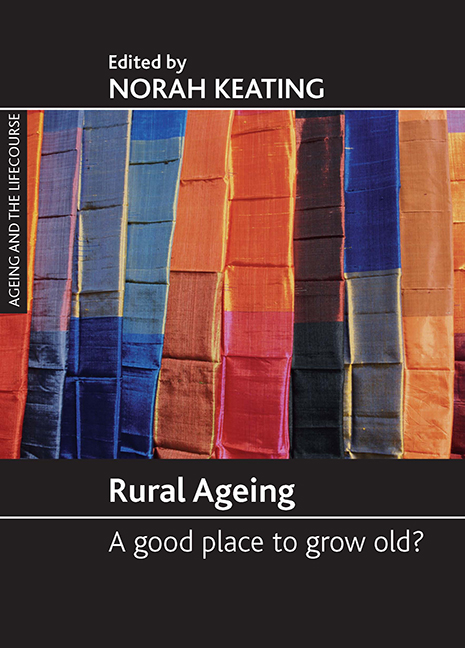Book contents
- Frontmatter
- Contents
- Foreword
- Acknowledgements
- Notes on contributors
- one A critical human ecology perspective on rural ageing
- two Crossing borders: lifecourse, rural ageing and disability
- three Rurality and ageing well: ‘a long time here’
- four The evolution of networks of rural older adults
- five Distance, privacy and independence: rural homecare
- six Respite for rural and remote caregivers
- seven Ageing, disability and participation
- eight Participation in rural contexts: community matters
- nine Staying connected: issues of mobility of older rural adults
- ten Ageing and social exclusion in rural communities
- eleven Age-friendly rural communities
- twelve Revisiting rural ageing
- References
- Index
- Other titles in the Ageing and the Lifecourse series
one - A critical human ecology perspective on rural ageing
Published online by Cambridge University Press: 19 January 2022
- Frontmatter
- Contents
- Foreword
- Acknowledgements
- Notes on contributors
- one A critical human ecology perspective on rural ageing
- two Crossing borders: lifecourse, rural ageing and disability
- three Rurality and ageing well: ‘a long time here’
- four The evolution of networks of rural older adults
- five Distance, privacy and independence: rural homecare
- six Respite for rural and remote caregivers
- seven Ageing, disability and participation
- eight Participation in rural contexts: community matters
- nine Staying connected: issues of mobility of older rural adults
- ten Ageing and social exclusion in rural communities
- eleven Age-friendly rural communities
- twelve Revisiting rural ageing
- References
- Index
- Other titles in the Ageing and the Lifecourse series
Summary
Introduction
The purpose of this chapter is to establish and describe the critical human ecology lens that challenges assumptions about growing older in rural areas. This lens is an essential element of the book in which we consider the interactions of older adults with the rural contexts that shape their experiences. Rural communities incorporate many elements of diversity that influence the lives of older adults: climate, landscape, distance from family networks, availability and access to services, migration patterns, community economic viability, age, gender roles and relationships. In this chapter we establish the structure and overall approach to the book, presenting the overall goals of the book and how the chapters address these goals. Throughout, we address the question: ‘Are rural communities good places to grow old?’.
Considering the ‘rural’ in rural ageing
The title of this book, Rural ageing, reflects our guiding assumption that experiences of ageing are diverse, and that understanding this diversity requires an expanded consideration of ageing in various contexts. Rural is one such context. As Bonnie Dobbs and Laurel Strain note in Chapter Nine, a substantial proportion of the world's population lives in rural areas – from approximately 25% in North and South America to more than 60% in Africa and Asia. Older adults are over-represented in these rural places and their proportion of the population is growing faster than in urban areas (Hart et al, 2005; Statistics Canada, 2007a).
Increasing importance is attached to the geographies of rural areas (Cloke et al, 1997; Friedland, 2002), challenging views of hinterlands bereft of opportunity and socially and culturally lagging (Wiebe, 2001) or of idyllic pastoral settings (Bell, 1997). Such unidimensional views of rurality leave little scope for understanding the variety of rural places. Furthermore, older adults have often been made invisible by ‘predominantly male, white, middle class, middle-aged, straight and able-bodied’ views of rural residents (Cloke et al, 1997, p 211). We expand these rural discourses through our focus on the lives of a variety of older adults in diverse rural surroundings.
There are a number of ways in which one can understand rurality, and definitions have been the subject of much debate. However, they can be broadly categorised within two approaches. These are rural as a distinctive type of locality and rural as a social representation (Halfacree, 1993; Atkin, 2003).
- Type
- Chapter
- Information
- Rural AgeingA Good Place to Grow Old?, pp. 1 - 10Publisher: Bristol University PressPrint publication year: 2008
- 4
- Cited by



